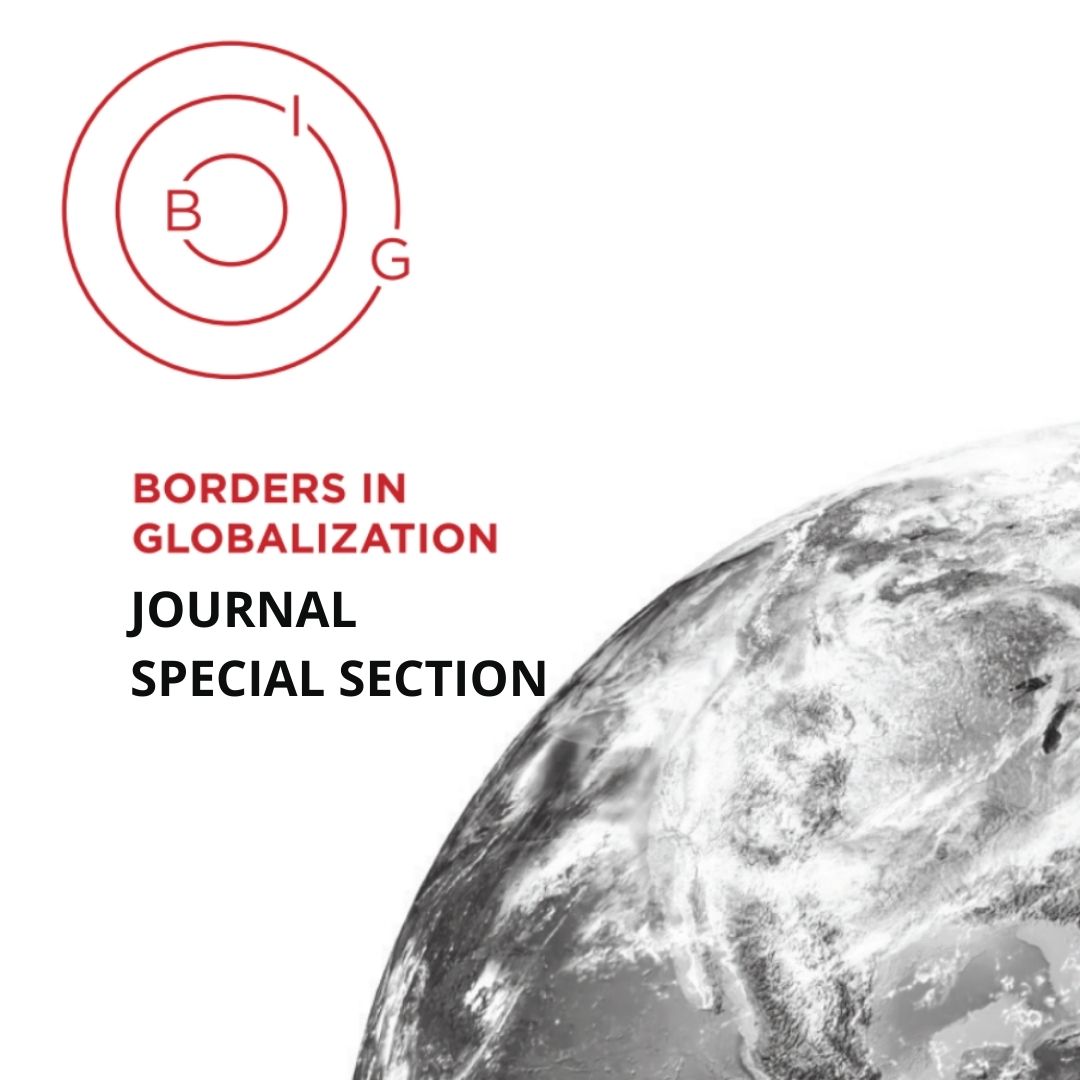BIG Indigenous Speaker Series — Internationalism: De-theorizing Indigenous (Australia) relationality in Water reform diplomacy
featuring Dr. Virginia Marshall (Australian National University)
Join us on Tuesday, September 9th at 3pm (PST) for a special talk from Dr. Virginia Marshall: ‘Indigenous Internationalism: De-theorizing Indigenous (Australia) relationality in Water reform diplomacy’.
Virginia Marshall is a Research Fellow based at the Australian National University’s School of Regulation and Global Governance. She is a practicing lawyer and leading legal scholar with expertise in Aboriginal water rights, native title rights in Sea Country, Indigenous governance and the intersection of Traditional Knowledge systems and western intellectual property regimes, especially as it relates to Indigenous commercialization of traditional medicines.

with Dr. Andrew Burridge (Senior Lecturer, Macquarie University, Australia) | Zoom and University of Victoria, BC | 10:30AM PST, June 4, 2025
In Person: CFGS C168 (Sedgewick building, University of Victoria) or Zoom. The meeting will take place from 10:30am to 12pm PST. Please register here to attend this event via Zoom.
The hotel has mostly escaped the focus of those who have critically investigated spaces and practices of immigration detention and border governance. However, hotels have a long history in their use as temporary – as well as longer-term – incarceration and bordering, globally (Davidson, 2018). While hotels have been discussed within a geopolitical framing, their role in bordering practices, and specifically how they operate as carceral sites, has not yet received the necessary attention required to understand their continued use for this purpose. As Mountz et al. (2013: 523) argue, “detention systems do not operate in isolation, but rather are intensified by the growth of related global industries and policies that become enmeshed in distinct geopolitical landscapes.”
Following in the footsteps of the ‘hotel geopolitics’ agenda developed by Fregonese and Ramadan (2015), Andrew illustrates how hotels become integrated into border regimes. In doing so, he contributes to debates on the material and infrastructural dimensions of bordering practices and specifically to the literature on carceral geographies, polymorphic bordering and the politics of mobility.
Andrew Burridge is a political geographer, based in the Discipline of Geography and Planning, School of Communications, Society and Culture, at Macquarie University, in Sydney, Australia. Andrew’s work has focused primarily upon undocumented migration, the effects of border securitization and immigration detention, as well as asylum and refugee reception and settlement. He has worked with several immigrant and refugee rights organizations including No More Deaths/No Más Muertes (US), Bristol Refugee Rights and Right to Remain (UK), and the International Detention Coalition. He is co-editor of the collection Beyond Walls and Cages: Prisons, Borders and Global Crisis (UGA Press, 2012).

Distinguished Resident Fellow – University of Victoria
Evert Lindquist
Dr. Lindquist joined the School of Public Administration in 1998, serving as the Director until 2009 and again from January 2012 to June 2015. Professor Lindquist has been the Editor of Canadian Public Administration, the journal of the Institute of Public Administration of Canada since January 2012. He was awarded BC Lieutenant Governor’s Silver Medal Award for Excellence in Public Administration, Institute of Public Administration of Canada (Vancouver/ Victoria Regional Groups), 23 June 2016.
Professor Lindquist’s first academic appointment was in the University of Toronto’s Department of Political Science (1988-98). He was the first Visiting Scholar at the Treasury Board of Canada Secretariat (1992-94), a Visiting Scholar at Griffith University in 2004, and a Senior Academic Visiting Fellow with the Canada School of Public Service. During 2010 and 2011, Professor Lindquist held the ANZSOG-ANU Chair in Applied Public Management Research at the Australian National University.

Senior Non-Resident Fellow – Charles Sturt University
Jamie Ferrill
Dr. Jamie Ferrill is a senior lecturer at the Australian Graduate School of Policing and Security, Charles Sturt University in Canberra. She has nearly a decade of practical experience, having worked for the Canada Border Services Agency before transitioning to academia. Her research focuses on national and economic security, with an emphasis on cross-border governance, border management, and transnational crime. Jamie has been a visiting fellow at the Academy of International Affairs NRW and the Border Policy Research Institute, and she is a fellow of the Financial Integrity Hub at Macquarie Law School and the Institute of Intergovernmental Relations at Queen’s University. Jamie is a co-editor of the Control, Security, and Surveillance section in Oxford Intersections: Borders (Oxford University Press).

BIG_Review 5.2
The new issue of Borders in Globalization Review is published! You’ll find cutting-edge research in border studies, extensive policy analyses, border artwork, film reviews, and book reviews. We hope you enjoy it!
Leading the issue are two innovative research articles. First, Berfin Nur Osso integrates critical analysis of European Union migration policy with artistic expressions of refugees and other migrants on the move, featuring their narratives and their paintings. Then, for our French readers, Abdoulaye Ngom presents a case study of a Senegalese family arranging for one of their sons to undertake a precarious journey to Europe, chronicling the complexity of the dilemmas and trajectories they face.
Our readership has expanded to include policy makers in various border management organizations, customs and immigration, and border regions world-wide. So in this issue’s policy section, you’ll find policy papers from South Africa, Italy, Zimbabwe, Moldova, and Australia that reflect this newly expanded scope. We are grateful for the important contributions of Jean Luc Erero, Paola Malaspina, Rwatida Mafurutu, Mihail Secu, and Jamie Ferrill and Allanah O’Hanlon. If you are reading BIG_Review and work in a border organization, your policy research is of interest to us. Do contact us—this indeed is a call for papers! This opportunity has been made possible thanks to the support of the World Customs Organization and Korea Customs.
The new issue is also rich with artwork engaging with the contradictions of borders. In the Chief Editor’s Choice Portfolio, featured on the cover, artist Laurent Reynès shares an innovative sculpture of border lines, conceptualizing the connections and hardships they engender. The work is the product of civil society collaboration with students from the University of Strasbourg, at the Center of Excellence’s 2023 Castle-talks on Narratives on Borders in Europe. In our poetry section, readers will find six poems grappling with borders, four poems by European poet Loris Ferri and two by Canadian Chad Norman. We then present a bold project of activism and artwork, the Navire Avenir, or, the Vessel of the Future, a campaign to conceptualize and actualize an appropriate life-saving response to the crisis of migrants lost at sea, brought to you by the Collectif du Navire Avenir.
Once again, our issue closes with two film and two book reviews. Sinem Arslan and Murat Çemrek recap recent cinema that dramatizes life struggles against closed borders in Turkey and Palestine respectively. Finally, Emmanuel Brunet-Jailly and Victor Konrad review recent academic publications in border studies.
Print editions are now available for purchase, and electronic copies are available for free online in Creative Commons open-access licensing. We hope you not only enjoy BIG_Review but share it as well!

Jamie Ferrill
Charles Sturt University
Dr. Jamie Ferrill is the discipline lead and lecturer in financial crime studies and lecturer at the Australian Graduate School of Policing and Security, Charles Sturt University. She has nearly a decade of law enforcement experience, having worked for the Canada Border Services Agency before her academic career. Her research focuses on national and economic security; her current focus is on border governance, transnational cooperation and collaboration, and organizational processes.

Special Section: Patterns in Border Security: Regional Comparisons
Commonwealth & Comparative Politics | Volume 59, Issue 4 | 2021
This special issue of Commonwealth & Comparative Politics raises the prospect of trust-based determinants of security communities other than cultural similarity. The case studies in this special issue document the emergence of cross-border and transgovernmental policy and enforcement networks that facilitate policy development, implementation and alignment through coordination, cooperation, and collaboration: nascent communities coordinate, ascendant communities coordinate and cooperate but struggle to collaborate, while mature communities coordinate, cooperate, and collaborate. Specifically, pluralistic forms of communication and interactions away from the actual borderline seem to play a key role in the emergence of friendly and trustful relationships among border dyads that need not necessarily be contiguous.
Contents
Foreword by Kunio Mikuriya
Introduction by Christian Leuprecht, Emmanuel Brunet-Jailly, Todd Hataley & Tim Legrand
The United States–Canada security community: a case study in mature border management by Christian Leuprecht, Todd Hataley, Kelly Sundberg, Keith Cozine & Emmanuel Brunet-Jailly
Security beyond the border: exploring Australia and New Zealand trans-Tasman relations in a globalised world by Jamie Ferrill, Germana Nicklin, Tim Legrand & Haydn McComas
Between triple borders: border security across Latin America’s Southern Cone by Adriana Dorfman, Rafael Francisco França & Julian Mokwa Felix
Border security management in the MENA region: models of nascent and ascendant coordination and cooperation by Daniel Meier
Border security in Africa: the paradigmatic case of the Sahel as the embodiment of security and economy in borderlands by Thomas Cantens
So similar yet so distant: border security management between India and Pakistan as a laboratory of non-experimentation by Dhananjay Tripathi
Funding
This work was supported by Social Sciences and Humanities Research Council of Canada [895-2012-1022].

Patterns in Border Security: Regional Comparisons
Christian Leuprecht, Todd Hataley, Emmanuel Brunet-Jailly | Routledge | 2022
How do security communities transform into security regimes? This book compares the construction of cross-border security regimes across five regions of the world to illustrate how trust emerges from the day-to-day relations of coordination, cooperation, or collaboration. Patterns in Border Security: Regional Comparisons studies the way borderland communities develop, implement, and align border policy to enhance their sense of security. Borders have been evolving rapidly in direct response to the multifaceted challenges brought on by globalization, which has had a nuanced impact on the way borders are governed and border security is managed. Taking a methodical comparative regional approach, this book identifies and contrasts determinants of nascent, ascendant, and mature border security regimes, which the book documents in seven regional case studies from across the globe. The findings identify conditions that give rise to cross-border and trans-governmental coordination, cooperation, or collaboration. Specifically, pluralistic forms of communication and interactions, sometimes far from the actual borderline, emerge as key determinants of friendly and trustful relations among both contiguous and non-contiguous regions. This is a significant innovation in the study of borders, in particular in the way borders mediate security. For six decades international security studies had posited culture as the bedrock of security communities. By contrast, the book identifies conditions, a method, and a model for adequate and effective cross-border relations, but whose outcome is not contingent on culture.
Editors:
Christian Leuprecht is Class of 1965 Professor in Leadership, Department of Political Science and Economics, Royal Military College of Canada; Director of the Institute of Intergovernmental Relations, School of Policy Studies, Queen’s University, Canada; Adjunct Research Professor, Australian Graduate School of Policing and Security, Charles Sturt University, Australia; and Munk Senior Fellow in Security and Defence at the Macdonald Laurier Institute. A former Fulbright Research Chair in Canada-US Relations at the School for Advanced International Studies at Johns Hopkins University in Washington, DC (2020) and a former Eisenhower Fellow at the NATO Defence College in Rome (2019), he is a recipient of RMC’s Cowan Prize for Excellence in Research and an elected member of the College of New Scholars of the Royal Society of Canada. He is Editor-in-Chief of the Canadian Military Journal.
Todd Hataley is Professor in the School of Justice and Community Development at Fleming College in Peterborough, Ontario, Canada; Adjunct Associate Professor at the Royal Military College of Canada; and a former Fulbright Research Chair in Canada-US Relations at Johns Hopkins University. He is a retired member of the Royal Canadian Mounted Police. During his tenure as a federal police officer, he conducted investigations into the smuggling of drugs, weapons and humans, money laundering, organized crime, national security, and extra-territorial torture investigations. His research focuses on managing of international boundaries, public safety, Indigenous policing, and transnational crime.
Emmanuel Brunet-Jailly is Professor in the School of Public Administration, Jean Monnet Chair and Director of the Jean Monnet Centre and the Borders in Globalization Laboratory at the University of Victoria, Canada. He is Editor of the Borders in Globalization Review.

Distinguished Non-Resident Fellow – Royal Military College of Canada
Christian Leuprecht
Christian Leuprecht is Distinguished Professor at the Royal Military College, Editor-in-Chief of the Canadian Military Journal, Director of the Institute of Intergovernmental Relations at Queen’s University, Adjunct Research Professor in the Australian Graduate School of Policing and Security at Charles Sturt University, and senior fellow at the Macdonald Laurier Institute. An elected member of the College of New Scholars of the Royal Society of Canada and a recipient of RMC’s Cowan Prize for Excellence in Research, he has held visiting fellowships at the Wilfried Martens Centre for European Studies in Brussels, Germany’s Academy of International Affairs NRW, Fulbright Research Chair in Canada–US Relations at John Hopkins University’s School for Advanced International Studies, Eisenhower Fellow at the NATO Defence College, Matthew Flinders Fellow at Flinders University of South Australia and Bicentennial Professor in Canadian Studies at Yale University (2009-2010).

Summer Workshop: Canadian Borders Policies in Comparative Perspectives
Victoria, Canada | July 12, 2019
UVic’s Borders in Globalization (BIG) research program in partnership with Canada Border Services Agency (CBSA), and with funding from the Erasmus+ Programme of the European Commission, hosted a one-day workshop to explore specific policy-relevant questions on Canadian borders. The workshop had approximately 10 students present and discuss research papers with experts, scholars and border officials. This workshop provided an outstanding opportunity to conduct and present targeted research to the policy-makers who will use the knowledge, in addition to professional development and networking opportunities.
The research papers covered three topics:
Topic 1: Asylum. What border policy reforms have been introduced in EU Member States over the past 5 years in response to the significant influx of asylum seekers in Europe? For example, reforms to entry / exit controls, identity management, public safety, security screening, and immigration enforcement measures.
Topic 2: Immigration Enforcement. Propose an analytical framework for assessing the gender-based analysis plus (GBA+) considerations with respect to developing immigration enforcement policy, including detention and removal.
Topic 3: Screening. Which countries, over the past 15 years, have had governments that have been involved in terrorism, systematic or gross human rights violations, a war crime, crimes against humanity or genocide? Compare and contrast Canada’s designated regime list with similar measures in place in other countries including the United States, United Kingdom, Australia, New Zealand, and/or EU Member States.

